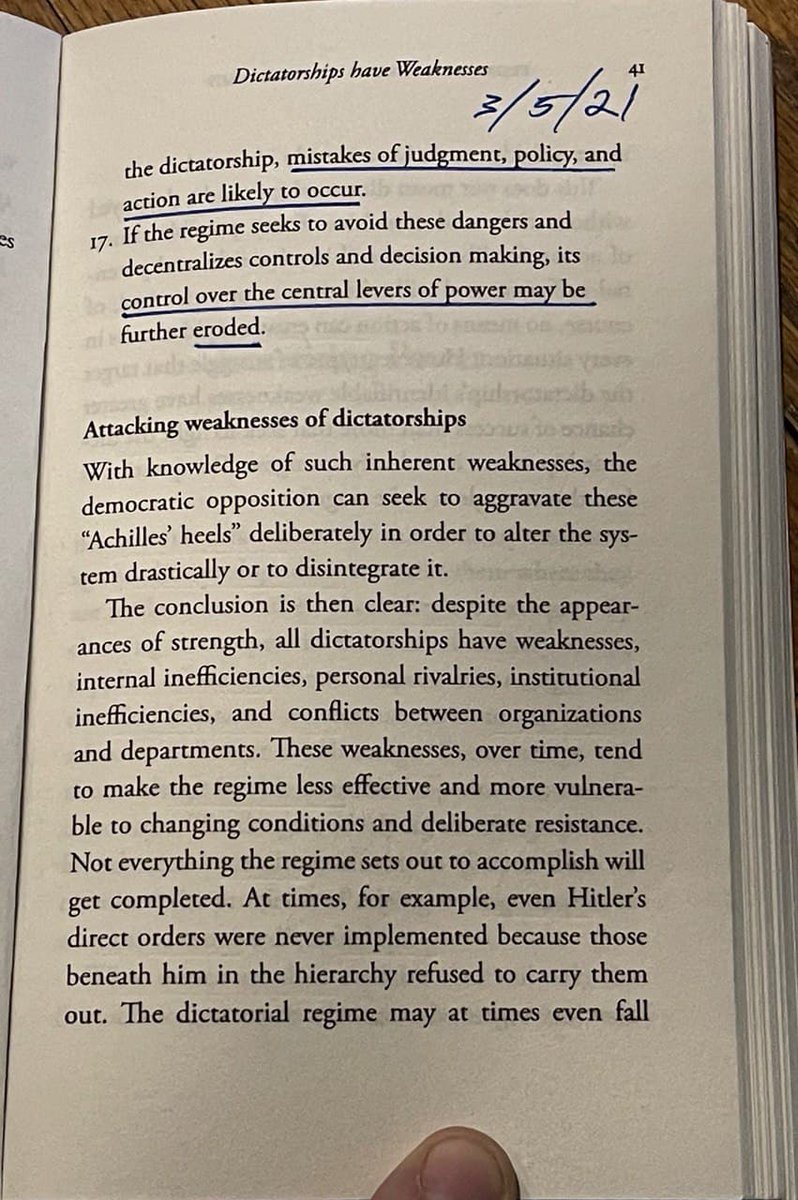
17 May 2021 #MAGAanalysis
#FromDictatorshipToDemocracy – Chapter 5: Exercising Power
This chapter (and especially page 44) has truly slowed my 2nd reading of this book, dramatically. I won't fully know why till I'm on the other side of the speed bump.
#FromDictatorshipToDemocracy – Chapter 5: Exercising Power
This chapter (and especially page 44) has truly slowed my 2nd reading of this book, dramatically. I won't fully know why till I'm on the other side of the speed bump.

2) Perhaps part of the answer comes from this quote on the next page: "Nonviolent struggle is a much more complex and varied means of struggle than is violence."
Let's ponder what that means.
Let's ponder what that means.
3) Complexity and simplicity can be defined by very simple math. It can be reduced to more than (>) vs less than (<) each other. A pencil with graphite and wood is a simpler thing for its 2 parts, than is a pen with its tip, ink source, casing, etc. The pencil is simpler.
4) To drive home the obvious point, the car on the left - same make and model - is simpler than the car on the right. There are many more parts now, organized in ways unimaginable in 1964. 



5) Nonviolent Struggle is vastly more complex than violence. It is far easier to punch someone in the mouth to make them stop speaking than it is to persuade them that what they're saying should not be said. Nonviolence is more complex. Yes?
6) It gets worse. Nonviolence does NOT = Political Defiance. Nonviolence is a method. It's built on both values and strategy - it's vastly more powerful than violence - but remains a method, not a...thing.
7) Defiance is a thing. It is an action. You may defy either violently or nonviolently. It is just opposition to a person or group holding power over you. We look up to our betters, the good and the great, the rich and the mighty, and we may defy them. The flow is upward.
8) Political Defiance adds more complexity. There are two upward domains, now. The 1st is government, the 2nd is laws. Each is over us, we below it. We are repeatedly reminded that no one is ABOVE the law. It's the government's job to ensure that fact.
9) This is why revolutions of any sort, violent or nonviolent, etc., are so rare. Looking up and the law and its enforcers how does the solitary citizen sum up his fighting spirit? Defiance is far easier said than done.
10) Not that you need to, but you may easily look up the history of our colonial rebellion against our rulers, lords and king across the ocean. You might simply read our Declaration of Independence. It lists out the complex history of our king's many failures and crimes.
11) Our Declaration also walks through the long history required for us to find our defiant will. I think I've found the real problem. As in right this moment. Leadership. Sharp discusses things that leaders must do. He doesn't talk about them, themselves, much.
12) It's extremely simple to see why George Washington tops just about every list of great presidents. He was our primary leader through both the revolution and the succeeding framing and ratification of our Constitution, then led through 2 terms and stepped down.
13) He even led posthumously by freeing his slaves. Whenever anyone tries to tell you that America is evil, and they prove this by slavery, remind them of Washington and his tie to the coming Civil War that wiped out the evil institution in the 13th & 14th Amendments.
14) Placing all this in the context of Sharp's book, I am finally able to identify a certain sense of cold aloof. This, of course, takes me right back to the question of violence itself. What would you die for is a mighty question. What would you kill for is equally so.
15) We recently watched Mel Gibson's incredible movie, Hacksaw Ridge. It was especially powerful for me, personally, as I was raised a Seventh-day Adventist, as was the movie's hero. And, before I left the church, I too would have been a conscientious objector.
16) I remained 100% opposed to weapons - who remembers the "gun of the hand" from the movie Witness? - and would not allow my children to have even toy guns, not even water pistols. You can only imagine their shock when I took up swordsmanship.
17) Before turning to Sharp's 7-pointed list describing Political Defiance, allow me just to emphasize that I do NOT proscribe all violence any longer, at all. I am just against it until nothing else is possible, and am for making other things possible, forever, if possible.
18) Here's the list. Political Defiance:
1) It rejects a dictator's right to determine the mode of combat.
2) It is near impossible for the regime to combat.
3) It attacks the dictators weakness and severs him from his sources of power.
4) It may be dispersed or concentrated.
1) It rejects a dictator's right to determine the mode of combat.
2) It is near impossible for the regime to combat.
3) It attacks the dictators weakness and severs him from his sources of power.
4) It may be dispersed or concentrated.
19) Continued:
5) It triggers errors in the dictator, both in judgment and action.
6) It employs societies, institutions, and can lead the entire population against the dictator.
7) Its power distribution supports true freedom after disintegrating the dictatorship. Forever.
5) It triggers errors in the dictator, both in judgment and action.
6) It employs societies, institutions, and can lead the entire population against the dictator.
7) Its power distribution supports true freedom after disintegrating the dictatorship. Forever.
20) I can't be sure, but I strongly suspect that both strategically and tactically #5 is the mightiest of the seven. Dictators cannot see the consequences of their evil. They only see the immediate benefit. Well, long term benefits too, to be sure. But still...
21) I'll give you an example. The Democrats only saw victory by theft for the outcome of "winning." They have no idea how that very act is inexorably weakening them. They cannot win this, and will now, forever, be the party that stole a landslide election. This will destroy them.
22) I must repeat my confession that I do NOT have a good track record with such predictions. I wrongly predicted the fall of the Communist Party in China, by the date or our election. I failed to factor their power with both parties here into my analysis.
23) That repeated, I still stand behind my assessment that the Democrat Party is the walking dead, already. Who remembers the Whigs? They were a mighty party at the beginning of the 19th century here in America. They lived from 1833 to 1856, and then died.
24) Who remembers our 1st Party, the Federalists? They completely ruled the founding of nation, coming into existence in 1789, and holding complete power until 1801. (Yes, I had to look up these facts, I did not have the dates by memory.)
25) So, let us remember that great Parties die. They may be slain. It is our job to do so. Who remembers Carthage and the simple statement: Carthago delenda est? Carthage must be destroyed. Carthage was Rome's greatest enemy, threat, and competitor.
26) With a little help from Google translator:
Democratiam Partium delenda est.
The Democrat Party must be destroyed.
Democratiam Partium delenda est.
The Democrat Party must be destroyed.
27) At least for today, then, I'm calling - at the national level - that we focus on #5. We must trigger their errors of judgment and action. We must do more, though. We must ensure that the consequences of those errors strike home, inexorably. With progressive, incurable impact.
28) Before I attempt to help such a campaign, nationally, I must invest everything I am able into the laboratory of my own local county. That, however, does not mean others can't go right ahead and get started now. I will send this analysis to @GenFlynn for that reason.
29) Locally, my first job must be to breathe a bit of life into the Republican Party. I have resisted this, but I am now completely surrendered. I will literally drive to our county office this afternoon and sign up for membership in the Party.
30) In the meantime, please keep up your studies into the required reading list. Those that are, already, report to me that it is actually helping. If you've already started that, then please share the list and recruit others. 

Thread ends at #30.
Please join our marvelous conversation at Telegram to discuss your reading and action plans, and progress.
t.me/TheConsigliori
Please join our marvelous conversation at Telegram to discuss your reading and action plans, and progress.
t.me/TheConsigliori
• • •
Missing some Tweet in this thread? You can try to
force a refresh













